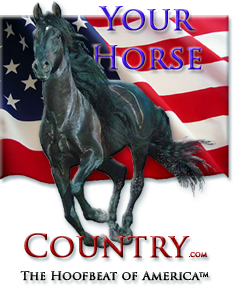|
Two Lane Livin' Your Horse
Country Column archives...
December
2010 - People and horses should graze small amounts frequently to help
reduce health problems.
Written by Dawna B. Smith,
Journalist and Reporter, writer of the monthly "Your Horse Country" column for
Two Lane Livin' Magazine
Used
to perpetually grazing and consuming small meals, many horses suffer when
subjected to reduced forage intake or when fed too much at one time. Their
digestive system is monogastric not ruminant, like a cows.
A
horse's "upper gut", stomach and small intestine, is where most
of the few nutrients are digested and absorbed. The unique characteristics
of its "hindgut" or large intestine allows for the utilization
of cellulose and other fermentable feed similar to the way cows digest
using their forestomachs.
Did you know that a horseís stomach absorbs few nutrients, and proteins
and carbohydrates are only partially digested before passing to the
intestine? A horse's stomach is about 10% of its intestinal tract compared
to 70% for a cow's, and has only a 14% feed
capacity. Itís why horses cannot handle large feedings.
If
a horseís stomach remains empty, the excess gas produced can rupture its
stomach, killing the horse. Itís important that horses eat frequent,
small portions to avoid "overeating", which can cause other
injuries such as colic, founder, or damage to its stomach.
Once
food hits the horseís stomach, it passes quickly into the small
intestine. Because horses donít have that much gastric acid to go around
(i.e. only has a 14% stomach capacity), if fed large meals, they usually
donít have enough gastric acid secretions to adequately cover their
digestive needs. Everyoneís digestion, including horses and cows, begins
with mouth saliva starting the process, and then our tummyís gastric
ďjuicesĒ start to break down what went down our throats. If it
doesnít agree with us, we have the benefit of being able to throw up the
offending mass. A horse canít.
Since
the stomach rapidly passes feed to the small intestine, REMEMBER: ground or chopped feed increases the passage rate and
decreases nutrient absorption. Since
the upper gut makes up about 40% of the digestive tract and what goes in
passes through quickly, itís not hard to overwhelm the horseís
digestive capacity, which can result in excessive gas and lactic acid
production, leading to colic or founder. Again, this is why horses should
be fed small amounts 2 to 4 times a day.
Horses
have the most complex and biggest hindgut of any domestic animal, and
itís made up of two large organs: the cecum (smaller) and the colon
(larger), representing about 60% of its digestive tract. Itís designed
to better utilize plant fibers and insoluble carbohydrates from forages
that were not digested in the small intestine. Food travels from the small
intestine first into the cecum, where undigested nutrients get fermented
similar to what happens in cowís stomachs. Itís this microbial
fermentation in the ďhindgutĒ that produces volatile fatty acids, an
important horse nutrient source. Serving as an important reservoir of
electrolytes and water, the important hindgut ensures the horse has enough
energy for sustained exercise, such as running away from you when he sees
the halter.
Food
then goes through the colon for more digesting and absorbing, moving very
slowly, because the colon folds back onto itself several times. Now you
know why a horseís digestion goes haywire when its sensitive nutrient
flow is interrupted or is abnormal.
Horses
tend to drink less during cold weather, usually because they arenít as
hot, and donít perspire as much. Reduced fluid intake with infrequent
dry hay feeding, can cause potential problems.
So,
reduce your stress this holiday season by keeping your horseís diet
simple as nature intended by focusing more on providing frequent small
meals of adequate hay, and less on concentrated processed feeds. Sound
familiar? Itís the advice given to most humans Ė graze in small meal
quantities lots of natural foods and drink plenty of water.
Happy
Holidays!
Bio:
Dawna Smith,
Journalist and Reporter, writes the monthly column "Your Horse
Country" for Two Lane
Livin' Magazine, based in West Virginia, as well as numerous articles regarding pain related medical issues for
LivePainFreeNow.com. A photographer and free lance writer, her op-ed articles have been published regarding a variety of subjects.
She and her husband have been strong advocates for the elderly and disabled since 1998,
and formed the non-profit HEADINGS (helping elderly and disabled in need gain support) to help ensure that legislature, Department of Health and Human Resources, and the Centers for Medicare and Medicaid heard their voices. †
She can be reached at dawna @ yourhorsecountry.com
304-765-0490.
|




